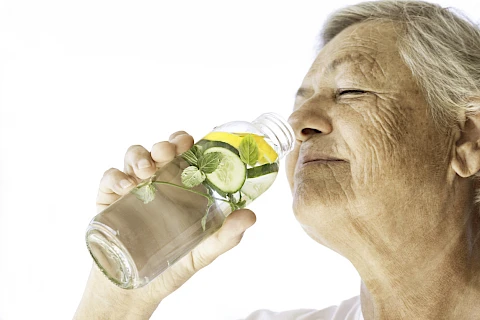
Staying properly hydrated is vital at any age, but it becomes even more critical for seniors. Adequate hydration helps maintain body functions like temperature regulation, joint lubrication, and nutrient transport. Maintaining proper hydration is an important concern that requires attention for seniors. Senior Helpers Northeast Atlanta is here to guide you through the importance of hydration, why it becomes more difficult with age, and how to ensure you're drinking enough fluids.
Why Hydration Becomes Challenging with Age
As we age, our bodies undergo several changes that make staying hydrated more difficult. Seniors often don't feel thirsty as much as younger people do, which can result in not drinking enough water throughout the day.
Aging kidneys might not be as efficient in conserving water, causing more water to be lost through urination. Some medications, such as diuretics or laxatives, can increase fluid loss and make it easier to become dehydrated. Additionally, mobility issues can make it harder for seniors to access drinks or frequently refill their cups, leading to lower fluid intake.
Tips for Increasing Fluid Intake
Despite these challenges, there are several easy ways to boost fluid intake. Establish a daily hydration routine by setting specific times of day for drinking water, such as before meals or after waking up.
Use reminders and alarms or hydration apps to remind you to drink water throughout the day. Incorporate water-rich foods like cucumbers, watermelon, and lettuce into your diet. If water seems boring, try adding natural flavors like lemon, lime, or cucumber slices. Also, enjoy it at a temperature you find refreshing, whether it's cold or warm.
Recognizing Signs of Dehydration
Look out for dry mouth, fatigue, dizziness, dark urine, and reduced urine output. These are signs that you may need to drink more fluids. Severe dehydration symptoms like confusion, rapid heartbeat, low blood pressure, or fainting require immediate medical attention. Check your hydration levels regularly. If you're a caregiver, make it part of your routine to ensure your loved ones stay hydrated.
Hydrating Food and Drink Options
Luckily, staying hydrated isn't just about drinking water. There are plenty of foods and beverages that can help you meet your hydration needs:
- Water-rich fruits and vegetables: Include strawberries, oranges, grapes, and veggies like cucumber, zucchini, and celery in your meals.
- Herbal teas and broths: Herbal teas can offer a flavorful way to increase fluid intake. Broths and soups are also great options, as they provide both fluids and nutrition.
- Low-sugar sports drinks: These can help replace electrolytes lost through sweating, especially after physical activity.
- Hydration supplements: For those struggling to get enough fluids, consider hydration supplements or electrolyte tablets. Always consult a healthcare provider before adding new supplements to your routine.
Contact Senior Helpers for Compassionate Care Services
By understanding why hydration can be more challenging with age and implementing simple tips, seniors and their caregivers can ensure sufficient fluid intake. Add more water-rich foods and drinks to your diet, and be vigilant about the signs of dehydration. If you or a loved one in Cumming, Duluth, Suwanee, Norcross, or Peachtree Corners need assistance with daily hydration or other senior care needs, contact us at Senior Helpers Northeast Atlanta today. Prioritizing hydration will lead to a healthier, happier life.